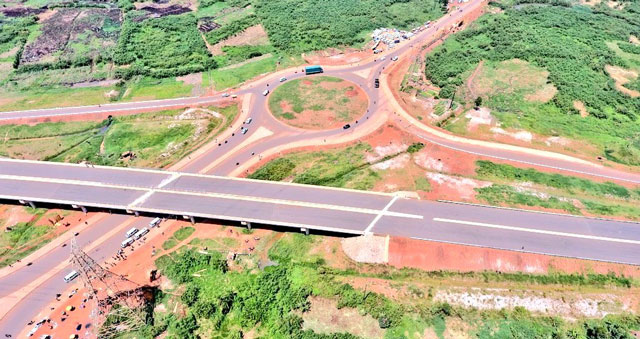
Kampala, Uganda | THE INDEPENDENT | East African Community Partner States will maintain high budgetary allocations geared towards financing infrastructure development within their national borders.
Monica Azuba Ntege, Uganda’s Minister for Works and Transport, and the Chairperson of the EAC Sectoral Council of Ministers for Transport, Communications and Metereology has said that the ongoing infrastructure development projects were meant to interlink the Partner States and create a strong Common Market in the region with sights on the Tripartite Grand Free Trade Area.
Speaking Wednesday during the opening session of the Infrastructure Roundtable on Day One of the EAC Heads of State Joint Retreat on Infrastructure and Health Financing and Development at the Speke Resort Munyonyo in Kampala, Uganda. Ntege said that the development of efficient, interlinked and modern infrastructure and energy systems will positively impact on trade, movement of persons, industrialization, value chains, employment, investments that would prepare the regional economies for socio-economic take-off.
Ntege disclosed that in their previous three Retreats focusing on Infrastructure Development and Financing the Heads of State had prioritized for implementation a total of 72 projects, split into 286 sub-projects over a 10-year period, ending in 2025.
“The projects span roads, railways, maritime ports, inland waterways, electrical power generation and transmission, and oil and gas infrastructure,” she said.
According to a statement from the East African Community, the minister said that upon the full implementation of the prioritized projects, the region will among other things have improved 7600 km of road surface, laid 4000 km of standard gauge railways, and increased the combined installed capacity of electrical power generation from 4245 MW to 6734 MW.
“We also hope to have constructed 3000 km of oil pipeline and an oil refinery, and (v) enhanced the performances of Mombasa and Dar es Salaam seaports and opened up new maritime and inland ports,” she said.
On road safety, Ntege said that East Africa had worrying statistics in terms of road fatalities as compared to the Africa and the rest of the world.
“According to the WHO, the average rate of global road fatalities in 2015 was 17 deaths for every 100,000 inhabitants. In Europe, this figure was 9.2 while in Africa it was 26.5 and current trends show that it is rising every year. For example, compared with the 2.9 road fatality rate of the United Kingdom, the countries in East Africa have rates higher than even the African average, with Tanzania at 32.9, Rwanda at 32.1, Kenya at 29.1 and Uganda at 27.4. This means that concerted efforts need to be made both on the physical and non-physical causative factors,” she said.
“It is reassuring to note that on the side of user behaviour, the EAC has recently developed standardized curricula for the training of commercial drivers which aims at instilling virtues like courtesy, speed perception and environmental awareness skills,” she added.
The Minister, however, said that Partner States should do more to instill and sustain proper behavioural competencies on all road users, including even law enforcement personnel, adding that percentage of accidents could be attributed to poor pavement and geometric road conditions and these should be addressed through infrastructure upgrading.
Ntege urged the EAC Secretariat to expedite the adoption of harmonized standards for road design and construction, by all the Partner States as directed by the Council and provide separations between motor cycles and vehicles.
“Resources should be mobilized to support the Partner States in the area of road safety to stem the tide of unnecessary deaths on our roads and reduce pressure on our hospital bed capacities now occupied by a large number of accident injury patients,” said Hon. Ndege.
In his remarks, the EAC Deputy Secretary General for Planning and Infrastructure, Eng. Steven Mlote, said that infrastructure development was recognized as the prime mover of socio-economic development in the region and would therefore continue to receive the highest level of political support from EAC Heads of State.
Eng. Mlote said the Joint Retreat would assess the progress of implementation of previously prioritized projects and consider and approve new infrastructure projects for joint/coordinated development.
“Therefore, this roundtable avails EAC Partner States an opportunity to showcase to our development partners and potential investors the major investment opportunities in infrastructure spanning railways, ports, roads, inland waterways, energy and civil aviation sectors,” said Eng. Mlote.
A separate EAC Roundtable on investing in Health Infrastructure, systems, services and research was held at the same venue.
The two-day Joint Retreat is being held under the theme Deepening and Widening Regional Integration through Infrastructure and Health Sector Development in the EAC Partner States.
****
Source EAC WEBSITE
 The Independent Uganda: You get the Truth we Pay the Price
The Independent Uganda: You get the Truth we Pay the Price





